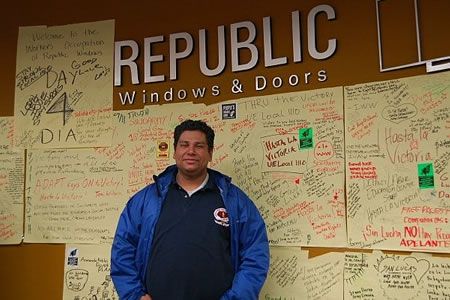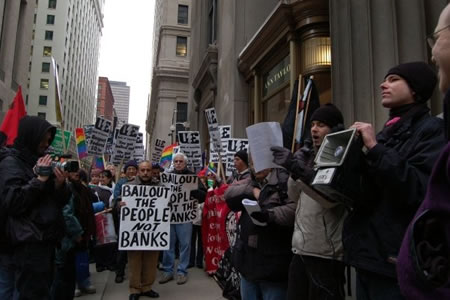Posted December 11, 2008

Spread the demand: Bail out People, not Wall Street!. Around the edge, these 2 1/8″ buttons read “Free Health Care,” “Defend Public Services,” “Living Wage Jobs,” “Free Higher Education,” “Troops Home Now,” “Rebuild the Gulf Coast,” and “Affordable Housing.” If you don’t have paypal, email us!
LAYOFFS HIT over half a million workers in November, pushing the number of people who have lost jobs this year to at least two million – in an economy that has three job seekers for each opening. Washington politicians have put the ‘Big Three’ on their knees for bailout package; the car companies blame “overpaid” union autoworkers, rather than their own mistakes, for the industry’s financial troubles. Meanwhile, the collapse of housing prices will only get worse. Realty analysts predict a “storm” of foreclosures and evictions. Meanwhile, as workers bear the brunt of the collapsing economy, government pledged over a trillion dollars of handouts to failed banks and other financial institutions.
It was in this context that workers at Chicago’s Republic Window & Door voted December 10 to end their six day sit-in, marking a clear victory for the first US factory occupation since the 1930s. Backed up by well-organized shifts of workers at the plant and spontaneous mobilizations of supporters around the country, the workers’ union, United Electrical Workers local 1110, won $1.75 million from Bank of America and JP Morgan Chase. This fund will cover eight weeks severance pay, two months of health coverage, and vacation pay for the mainly Latino workforce. The union is exploring possibilities for a “Window of Opportunity” foundation that would re-open the plant under worker control.

Victorious workers at Republic Window & Door. photo credit: Kim DeFranco
Laid off and not going anywhere
One week earlier, the company had told workers that they would be laid off with only three days notice because Bank of America had cut off credit needed to keep the plant open. No severance pay, immediate cut off of benefits. Workers had suspected something was up in the weeks before, as managers began to remove machines and furniture from the plant. So when the last day of work came, they voted to occupy the factory until winning their wages and benefits – preventing the removal of any more equipment by the company, which apparently planned to open a non-union plant in Iowa.
Oct. 15 — Republic Windows & Doors tells Bank of America that Republic had a party committed as of Oct. 24 to assume the company’s $3 million in debt. Bank of America rejects the offer, demands a plan for an “orderly” wind down of Republic.
Oct. 16 — Republic presents a plan for ceasing its manufacturing in January 2009 and tells Bank of America of possible worker notice issues and vacation pay covered by the WARN Act, which helps ensure advance notice of plant closings and mass layoffs.
Oct. 18 — Bank of America demands a shorter shut-down period.
Oct. 27 — Republic presents a new plan to cease operations in January.
Oct. 29 — Bank of America rejects it.
Nov. 25 — Republic requests permission to issue vacation pay to all employees.
Nov. 26 — Bank of America rejects the request.
News of the occupation quickly became a local cause for organized labor and the immigrant rights movement in Chicago, where supporters brought food and rallied outside the plant. By Saturday, the word had been spread online; on Monday, the first pickets outside of Bank of America corporate buildings had occurred in Charlotte and Atlanta. Further demonstrations were planned spontaneously for the next few days by supporters in nearly a dozen cities. An online petition from Jobs with Justice had received over 20,000 signatures by Tuesday night. The workers even won support – in words, at least – from president-elect Barack Obama and Illinois Senator Rod Blagojevich (we should add, one day before the latter was embroiled in a corruption scandal.)
 Supporters rally in downtown Chicago. photo credit: Kim DeFranco
Supporters rally in downtown Chicago. photo credit: Kim DeFranco
Lessons from Republic
Victories like this have importance that extends beyond the immediate gains of the workers involved. Their example shows that militant tactics can win. The UAW and other unions won bargaining rights only after workers occupied their workplaces. This militant tactic declares that people’s lives come before profit – and its return points a way forward for working class struggle in the new economic crisis. But there are other lessons as well.
The politically energized Latino community of Chicago was among the first to mobilize against the anti-immigrant Sensenbrenner Bill of 2006. This legacy clearly shows in the willingness of Republic’s mainly Latino workforce to sit in. The traditions of militancy and democracy in their union, the UE, were also important. Having a union was a huge strategic advantage for bargaining, resources, and publicity. This fact that should not be lost on the nearly nine out of ten US workers who do not enjoy the collective strength of a union. Passing the Employee Free Choice Act is essential to help more workers win union representation. Again, the fact that UE supported and reinforced the actions of its members is a model for the kind of democratic and militant unions that are needed.
Chicago’s labor and community organizations quickly sent messages of support and material aid to the factory occupation. Nationwide support with a clear target demonstrated the importance of solidarity with otherwise isolated struggles. Even small pickets at Bank of America branches amplified the strength of the workers in Chicago; the Coalition of Immokalee Workers has also used “corporate campaigns” targeted big business with great success.
Finally, the desire of the workers to re-open the plant under their own control, too, is a valuable lesson that should be spread far and wide. Much discussion of the auto bailout has focused on the appointment of a ‘car czar’ to regulate the industry. But no government bureaucrat can know how to manage the auto plants better than the workers who have run them for decades. At Republic Window & Door, in the auto industry, and elsewhere, workers should be front and center: blue and white collar workers – with the input of environmental groups and consumers – should elect production and research teams.
United Electrical Workers Director of Organization Bob Kingsley called the settlement in Chicago “a victory for workers everywhere.” Indeed it is. They’ve shown that workers facing hard times can fight back, and win. Let’s follow their example!
